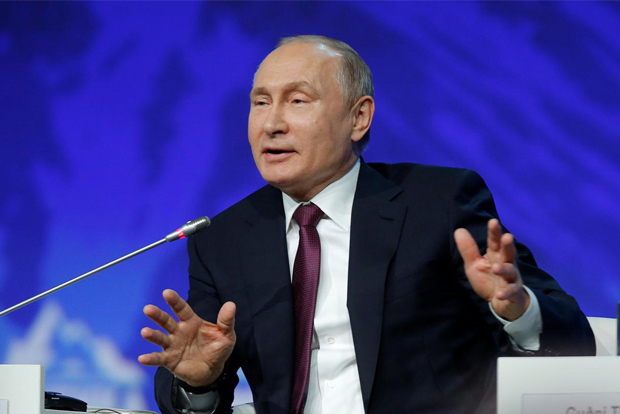Begin typing your search...
Russia passes bill allowing Putin to stay in power past 2024
The Russian parliament approved a sweeping constitutional reform in the third and final reading Wednesday, a move that will allow President Vladimir Putin to stay in power for another 12 years after his current term ends in 2024.

Moscow
The Kremlin-controlled lower house, the State Duma, endorsed a set of amendments to the constitution and a provision resetting the term count for Putin after the revised constitution goes into force.
It passed by a 383-0 vote with 43 abstentions, and was approved by the upper house, the Federation Council, several hours later.
A nationwide vote on the proposed amendments is set for April 22.
Kremlin critics condemned the move as a cynical manipulation and called for protests.
Putin, a 67-year-old former KGB officer, has ruled Russia for more than 20 years. After serving for two consecutive four-year terms — a limit outlined in the current version of the constitution — Putin shifted to prime minister's seat in 2008, with his close ally Dmitry Medvedev becoming a placeholder president.
The length of the presidency was extended to six years under Medvedev, and in 2012 Putin returned to the Kremlin as president. In 2018, he was re-elected for another six years.
Putin has weathered several international storms during his 20 years in power. The 2014 annexation of the Crimean Peninsula, which prompted a drawn-out, years-long conflict with Ukraine, significantly boosted his approval ratings back at home.
As Moscow's relations with the West soured over the 2014 annexation and more scandals followed, the Kremlin kept Putin's popularity high by painting Russia as a besieged fortress in need of a strong leader to withstand the outside pressure.
The constitutional reform passed by the Duma on Wednesday would allow Putin to run for presidency two more times after 2024. Before the national vote, it will be reviewed by Russia's Constitutional Court.
The changes redistribute the executive powers of the Russian government in Moscow and further strengthen the power of the presidency, while also banning same-sex marriage and listing “a belief in God” as one of Russia's traditional values.
The proposal to restart the term clock for the current president was put forward by 83-year-old former Soviet cosmonaut Valentina Tereshkova, now a Duma deputy, during the second reading of the amendments on Tuesday. Following Tereshkova's speech, Putin quickly arrived at parliament to address the lawmakers and supported the idea.
The move prompted immediate calls for protests from various opposition groups. On Tuesday night, about 200 people gathered near the Kremlin and lined up to hold solo pickets — the only form of protest in Russia that it legal without prior authorization from the government — against the reform.
"It was clear from the start that it is being done to keep Putin in power forever," opposition activist Alexei Miniaylo, who called for the pickets on his Facebook page on Tuesday, told The Associated Press. "But the brazen manner in which it was done elicited outrage.” Two opposition groups called for a bigger rally in Moscow on March 21 or March 22 and applied for authorization with the city authorities. Soon after, Moscow City Hall announced banning outdoor events with attendance of more than 5,000 until April 10, saying it was part of precautionary steps to prevent the spread of the new coronavirus.
Activists remained unfazed, however, and on Wednesday morning refiled their requests, amending the maximum number of participants from 50,000 to 4,500.
“Our position is that if the coronarivus is such a dangerous threat, then they should cancel the vote (on the constitutional reform), as it can expose millions of people to infection,” Mikhail Svetov, leader of the Civil Society movement, told the AP.
“And if it is not that dangerous, then rallies should be allowed.” Pickets and protests were being organized in other Russian cities as well, said Tatyana Usmanova, an activist with the “No” group formed two months ago to coordinate the opposition effort against the reform.
“It gets to people, because it is totally out of line,” Usmanova said.
Activists and analysts agree, however, that large-scale protests will be harder to organize because of coronavirus fears that are likely to deter people from taking to the streets.
“People are scared and less prone to gather for large demonstrations,” independent political analyst Kirill Rogov told the AP.
Visit news.dtnext.in to explore our interactive epaper!
Download the DT Next app for more exciting features!
Click here for iOS
Click here for Android
Next Story



